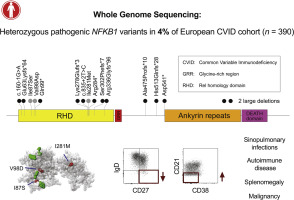Journal of Allergy and Clinical Immunology ( IF 14.2 ) Pub Date : 2018-03-02 , DOI: 10.1016/j.jaci.2018.01.039 Paul Tuijnenburg 1 , Hana Lango Allen 2 , Siobhan O Burns 3 , Daniel Greene 2 , Machiel H Jansen 1 , Emily Staples 4 , Jonathan Stephens 2 , Keren J Carss 2 , Daniele Biasci 4 , Helen Baxendale 4 , Moira Thomas 5 , Anita Chandra 4 , Sorena Kiani-Alikhan 6 , Hilary J Longhurst 7 , Suranjith L Seneviratne 3 , Eric Oksenhendler 8 , Ilenia Simeoni 9 , Godelieve J de Bree 10 , Anton T J Tool 11 , Ester M M van Leeuwen 12 , Eduard H T M Ebberink 13 , Alexander B Meijer 13 , Salih Tuna 2 , Deborah Whitehorn 2 , Matthew Brown 2 , Ernest Turro 2 , Adrian J Thrasher 14 , Kenneth G C Smith 4 , James E Thaventhiran 4 , Taco W Kuijpers 15 , 16

|
Background
The genetic cause of primary immunodeficiency disease (PID) carries prognostic information.
Objective
We conducted a whole-genome sequencing study assessing a large proportion of the NIHR BioResource–Rare Diseases cohort.
Methods
In the predominantly European study population of principally sporadic unrelated PID cases (n = 846), a novel Bayesian method identified nuclear factor κB subunit 1 (NFKB1) as one of the genes most strongly associated with PID, and the association was explained by 16 novel heterozygous truncating, missense, and gene deletion variants. This accounted for 4% of common variable immunodeficiency (CVID) cases (n = 390) in the cohort. Amino acid substitutions predicted to be pathogenic were assessed by means of analysis of structural protein data. Immunophenotyping, immunoblotting, and ex vivo stimulation of lymphocytes determined the functional effects of these variants. Detailed clinical and pedigree information was collected for genotype-phenotype cosegregation analyses.
Results
Both sporadic and familial cases demonstrated evidence of the noninfective complications of CVID, including massive lymphadenopathy (24%), unexplained splenomegaly (48%), and autoimmune disease (48%), features prior studies correlated with worse clinical prognosis. Although partial penetrance of clinical symptoms was noted in certain pedigrees, all carriers have a deficiency in B-lymphocyte differentiation. Detailed assessment of B-lymphocyte numbers, phenotype, and function identifies the presence of an increased CD21low B-cell population. Combined with identification of the disease-causing variant, this distinguishes between healthy subjects, asymptomatic carriers, and clinically affected cases.
Conclusion
We show that heterozygous loss-of-function variants in NFKB1 are the most common known monogenic cause of CVID, which results in a temporally progressive defect in the formation of immunoglobulin-producing B cells.
中文翻译:

功能丧失核因子 κB 亚基 1 (NFKB1) 变体是欧洲人常见可变免疫缺陷最常见的单基因原因
背景
原发性免疫缺陷病 (PID) 的遗传原因带有预后信息。
客观的
我们进行了一项全基因组测序研究,评估了大部分 NIHR BioResource-Rare Diseases 队列。
方法
在主要是散发性无关 PID 病例(n = 846)的主要欧洲研究人群中,一种新的贝叶斯方法将核因子 κB 亚基 1 (NFKB1)确定为与 PID 最密切相关的基因之一,并且这种关联由 16 个新的杂合截断、错义和基因缺失变体。这占队列中常见可变免疫缺陷 (CVID) 病例 (n = 390) 的 4%。通过分析结构蛋白数据评估预测为致病性的氨基酸取代。淋巴细胞的免疫表型、免疫印迹和离体刺激确定了这些变体的功能效应。收集详细的临床和谱系信息用于基因型-表型共分离分析。
结果
散发性和家族性病例均证实存在 CVID 的非感染性并发症,包括大面积淋巴结病 (24%)、不明原因的脾肿大 (48%) 和自身免疫性疾病 (48%),之前的研究表明其与较差的临床预后相关。尽管在某些家系中注意到临床症状的部分外显,但所有携带者都缺乏 B 淋巴细胞分化。对 B 淋巴细胞数量、表型和功能的详细评估确定了 CD21低B 细胞群增加的存在。结合对致病变异的识别,这可以区分健康受试者、无症状携带者和临床受影响的病例。
结论
我们表明NFKB1中的杂合功能丧失变异是 CVID 最常见的已知单基因原因,这导致产生免疫球蛋白的 B 细胞形成的时间进行性缺陷。


























 京公网安备 11010802027423号
京公网安备 11010802027423号